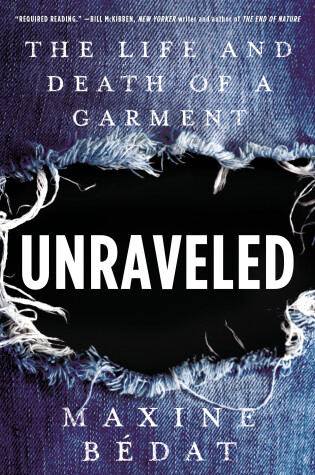
Longlisted for the FT/McKinsey Business Book of the Year Award
A groundbreaking chronicle of the birth--and death--of a pair of jeans, that exposes the fractures in our global supply chains, and our relationships to each other, ourselves, and the planet
Take a look at your favorite pair of jeans. Maybe you bought them on Amazon or the Gap; maybe the tag says "Made in Bangladesh" or "Made in Sri Lanka." But do you know where they really came from, how many thousands of miles they crossed, or the number of hands who picked, spun, wove, dyed, packaged, shipped, and sold them to get to you? The fashion industry operates with radical opacity, and it's only getting worse to disguise countless environmental and labor abuses. It epitomizes the ravages inherent in the global economy, and all in the name of ensuring that we keep buying more while thinking less about its real cost.
In Unraveled, entrepreneur, researcher, and advocate Maxine Bédat follows the life of an American icon--a pair of jeans--to reveal what really happens to give us our clothes. We visit a Texas cotton farm figuring out how to thrive without relying on fertilizers that poison the earth. Inside dyeing and weaving factories in China, where chemicals that are banned in the West slosh on factory floors and drain into waterways used to irrigate local family farms. Sewing floors in Bangladesh and Sri Lanka are crammed with women working for illegally low wages to produce garments as efficiently as machines. Back in America, our jeans get stowed, picked, and shipped out by Amazon warehouse workers pressed to be as quick as the robots primed to replace them. Finally, those jeans we had to have get sent to landfills--or, if they've been "donated," shipped back around the world to Africa, where they're sold for pennies in secondhand markets or buried and burned in mountains of garbage.
A sprawling, deeply researched, and provocative tour-de-force, Unraveled is not just the story of a pair of pants, but also the story of our global economy and our role in it. Told with piercing insight and unprecedented reporting, Unraveled challenges us to use our relationship with our jeans--and all that we wear--to reclaim our central role as citizens to refashion a society in which all people can thrive and preserve the planet for generations to come.
Eye Opening, Yet Critically Flawed. Bedat does *phenomenal* work in this text when reporting what she has found in her investigations of trying to track even a "typical" cotton *garment* from the cotton seed to its eventual use and destruction. Using each chapter as a way to trace one particular step in the chain was truly a stroke of editing genius, as it concentrates just what is happening at that particular stage. And some of it - including the direct link, in Bangladesh at minimum, between garment factories and sex work (where in one particular harrowing tale, a source tells Bedat that when she gets in the van to be taken to a factory as a day worker, she sometimes finds herself at a massage parlor instead) - is utterly horrific. It is these sections of the book that are *so* strong that the book *had* to be rated fairly highly.
HOWEVER, when Bedat speaks almost at *all* of policy or her own opinions... well, this is when the critical flaws become apparent. To be fair, she *is* at least somewhat more balanced than many leftists, and outright points out things that ardent Bernie Sanders / AOC types won't want to hear. But in her attacks of "neoliberalist capitalism" - a running strawman throughout the narrative - ... eh, I'll be a touch gentle and go with "YMMV". If you happen to be on that side, you're going to love her commentary here. If, like me, you find yourself more an adherent of Milton, Mises, Hayek, Bastiat, etc (the so-called "Austrian School of Economics")... you're not going to like her commentary so much. The star reduction, to be clear, isn't from the fact that I don't like much of the commentary - but that I can so easily refute it, despite not being a trained economist (just a - clearly ;) - well read human :D).
And yet, the actual reporting here is simply too strong, too eye opening. This is a book that *needs* to be read for its current issues reporting, if for no other reason - and even if her commentary leads one to contemplate defenestration of the book. If you've read Hafsa Lodi's Modesty or Virginia Postrel's Fabric of Civilization (among presumably numerous other recent texts on fashion / clothing/ fabric), do yourself a favor and read this one too. Even if you haven't, do yourself a favor and read all three books. ;)
Very much recommended.
Reading updates
-
Started reading
-
19 February, 2021:
Finished reading
-
19 February, 2021:
Reviewed
